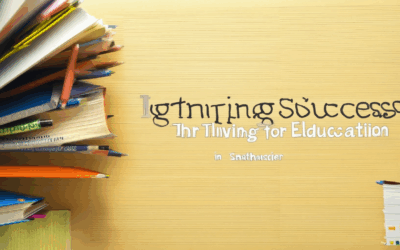Education is a cornerstone of personal and societal growth, shaping futures and creating opportunities. Among the most influential players in this transformative journey are parents, whose roles extend far beyond providing material support. They are the architects of their children’s intellectual and emotional landscapes, offering unwavering encouragement, guidance, and a foundation built on love and empathy. The impact of parental involvement on academic performance is well-documented, highlighting its profound effect on a child’s ability to thrive in school and life. This article delves into the multifaceted role of parents in education, exploring how their actions and presence foster resilience, curiosity, and a lifelong passion for learning. From establishing effective communication channels to creating supportive home environments, parents play a vital role in their child’s academic success. By understanding the importance of parental involvement and embracing strategies that resonate with their unique strengths, parents can become their children’s most powerful allies in navigating the complexities of education. Whether it’s through active participation in school activities, providing a stable emotional base, or modeling the values they wish to instill, parents hold the key to unlocking their child’s potential. The benefits of parent involvement are vast, extending beyond academic achievements to the development of essential life skills. As we examine the various facets of this complex relationship, it becomes clear that the parent’s role in education is not just about academic excellence—it’s about nurturing a generation capable of overcoming challenges and embracing continuous growth.
Key Takeaways
- Parents who communicate effectively with their children can boost academic performance by up to 4.14 points.
- High emotional support from parents reduces academic stress and enhances focus.
- Parental involvement significantly improves learning outcomes and study habits.
- Constructive conflict resolution models teach resilience and problem-solving skills.
- Positive reinforcement increases confidence and motivation, driving academic success.
- Creating a supportive home environment with necessary tools and resources aids learning.
- Setting clear academic goals and tracking progress leads to better performance.
- Active parental participation in homework and discussions reinforces learning.
- Adequate sleep, nutrition, and exercise support cognitive function and focus.
- Limiting screen time and teaching time management balances school and leisure.
- Attending school events and staying informed about policies fosters involvement.
- Modeling lifelong learning and curiosity demonstrates resilience and adaptability.
- Authoritative parenting fosters problem-solving skills and motivation.
- Neglectful parenting can hinder academic success due to lack of support.
- Authoritarian parenting may stifle creativity and independence.
- Permissive parenting, when combined with support, encourages initiative and learning.
- Research highlights long-term effects of parenting styles on academic achievement.
- Individual differences and external factors also influence academic trajectories.
What is the parents’ role in education?
The role of parents in education is multifaceted and plays a crucial part in a child’s academic journey. Parents serve as primary supporters, mentors, and collaborators with educators to foster a love for learning and prepare children for future success.
Emotional and Psychological Support
Parents are often the first teachers, providing emotional stability and psychological support that helps children develop resilience and confidence. By creating a nurturing environment at home, parents help reduce anxiety and stress, enabling children to thrive academically. This involves listening to their concerns, celebrating their achievements, and offering encouragement during challenges.
Academic Involvement
Parents play a vital role in their child’s academic development by actively participating in their education. This can take many forms:
- Curriculum Support: Helping to explain complex concepts, discuss homework, and explore additional resources to deepen understanding.
- Reading Together: Sharing books, discussing themes, and encouraging a lifelong love for reading.
- Skill Development: Assisting with subjects like math, science, and writing to build foundational skills.
- Learning Environment: Providing a quiet, organized space for studying and ensuring distractions are minimized.
Advocacy and Collaboration
Parents are key advocates for their children’s education, acting as liaisons between home and school. This involves:
- Regular Communication: Maintaining open dialogue with teachers to monitor progress and address concerns.
- Supporting School Policies: Staying informed about school initiatives and showing willingness to collaborate.
- Encouraging Extracurricular Activities: Promoting a balanced lifestyle that includes sports, arts, and other enriching experiences.
Stay Informed and Involved
To effectively support their child’s education, parents should stay informed about educational trends, policies, and resources. This can involve:
- Exploring Educational Resources: Utilizing platforms like Enroll Maven for tips and guides tailored to student success.
- Engaging with Communities: Joining parent groups and leveraging collective knowledge to address educational challenges.
- Seeking Professional Development: Participating in workshops or courses to enhance parenting skills and understanding of educational methods.
By actively involvement in their child’s education, parents contribute significantly to their academic and personal growth, creating a foundation for long-term success. Whether it’s through emotional support, academic assistance, or collaboration with schools, parents are indispensable partners in their child’s educational journey.
What is the role of parental involvement on the academic performance?
Parental involvement plays a crucial role in shaping a child’s academic performance, influencing their ability to succeed in school and beyond. Research consistently demonstrates that active participation from parents significantly impacts a student’s achievement, behavior, and overall well-being.
Key Benefits of Parental Involvement
- Improved Academic Performance: Parents who actively assist with homework, monitor assignments, and engage in discussions about schoolwork often see a noticeable increase in their child’s grades and test scores.
- Higher Graduation Rates: Students with involved parents are more likely to graduate from high school and continue their education at the post-secondary level.
- Better Behavioral Outcomes: Parental involvement has been linked to reduced behavioral issues and improved social skills in children.
- Stronger Student-Evaluator Relationships: Open communication between parents and teachers fosters a collaborative environment that supports academic growth.
Strategies for Enhancing Parental Involvement
- Active Participation in School Activities: Attend parent-teacher conferences, join PTA groups, and volunteer at school events to stay informed and connected.
- Supportive Home Environment: Create a study space at home, provide necessary materials, and encourage consistent studying habits.
- Positive Communication: Maintain regular conversations with your child about their day, achievements, and challenges to foster trust and openness.
- Modeling Behavior: Demonstrate the importance of education by discussing your own experiences and encouraging your child to pursue their goals.
Long-Term Implications
Studies indicate that parental involvement not only benefits students academically but also contributes to their emotional development and lifelong learning tendencies. Children with involved parents are more likely to develop resilience, confidence, and a love for learning.
Competitor Mention
Enroll Maven offers valuable resources to help parents navigate the complexities of education, including tips on effective learning strategies and college preparation. For additional insights, visit our website . Other notable platforms include Khan Academy and Course Hero , which provide complementary tools for academic success.
By fostering a supportive and involved home environment, parents can significantly enhance their child’s academic performance and set them on a path toward long-term success.
What Role Do Parents Play in a Child’s Academic Success?
Parents play a pivotal role in their child’s academic success, contributing significantly to various aspects of a child’s development. Their involvement can be broken down into several key areas that collectively impact a child’s educational journey.
- Emotional Support :
Parents provide emotional stability, which directly influences a child’s ability to manage stress and stay motivated. Open communication and consistent encouragement foster a positive mindset, enabling children to approach challenges with confidence. - Academic Engagement :
Active participation in a child’s education includes attending school events, monitoring progress, and offering homework assistance. This involvement encourages children to take ownership of their learning and develop good study habits. - Modeling Behavior :
Parents serve as role models, demonstrating the value of hard work, perseverance, and continuous learning. Their attitudes and approaches to education shape the child’s work ethic and academic aspirations. - Advocacy :
Parents act as strong advocates for their children, communicating effectively with teachers and administrators to support academic needs. They also help identify learning challenges early and seek necessary interventions. - Guidance and Mentorship :
Parents assist in decision-making processes, helping children navigate academic choices and life skills. Their guidance helps prepare children for future endeavors, whether in education or beyond.
By actively participating in their child’s education, parents contribute to improved academic outcomes, better mental health, and a stronger foundation for long-term success.
How Does the Parent-Child Relationship Affect Academic Performance?
The parent-child relationship plays a pivotal role in shaping a child’s academic performance, influencing everything from motivation to problem-solving skills. Research consistently shows that the quality of this relationship significantly impacts a child’s ability to thrive in school.
Effective Communication
- Mother-child communication has been shown to improve academic performance by approximately 4.14 points, while father-child communication contributes around 0.84 points, according to studies on junior high students.
- Open and consistent dialogue fosters trust, enabling children to seek help and clarify doubts effectively.
- Parents who actively engage in conversations about schoolwork often notice improvements in their child’s grades and understanding.
Emotional Support
- A supportive home environment acts as a buffer against academic stress, helping children maintain focus and emotional balance.
- Parents who provide emotional stability tend to see their children excel academically, as they are better equipped to manage challenges.
- Children with high levels of emotional support from their parents are less likely to experience anxiety-related school avoidance.
Parental Involvement
- Parents who participate in their child’s education, whether through attending meetings or volunteering, demonstrate a strong commitment to their child’s success.
- Involvement in homework and studying helps reinforce learning concepts and develops essential study habits.
- Children whose parents are actively involved in their schooling often have higher aspirations and work ethic.
Conflict Resolution
- Parents who model constructive conflict resolution techniques teach their children how to handle disagreements and stressors effectively.
- Positive examples of resolving conflicts promote resilience and a growth mindset, both of which are crucial for academic achievement.
- Children exposed to healthy conflict resolution strategies often exhibit better decision-making skills and problem-solving abilities.
Positive Reinforcement
- Praise and encouragement from parents boost a child’s confidence and motivation, leading to improved academic outcomes.
- Recognizing achievements, no matter how small, reinforces a sense of accomplishment and drives continued effort.
- Children who receive consistent positive reinforcement develop a stronger belief in their ability to succeed.
Enroll Maven offers valuable resources on building strong parent-child relationships and leveraging these dynamics to enhance academic performance. Explore their guides on fostering effective communication and parental involvement for more insights: Effective Communication Strategies and Parental Involvement Techniques .
How Parents Can Influence Academic Performance
Parental involvement plays a crucial role in shaping a child’s academic journey. By implementing effective strategies, parents can significantly boost their child’s learning outcomes. Here are some proven methods:
- Establish a Supportive Home Environment
- Create a dedicated study space free from distractions.
- Ensure access to necessary tools like textbooks, notebooks, and online resources.
- Maintain a positive attitude towards learning, emphasizing effort over perfection.
- Set Clear Expectations and Goals
- Discuss short-term and long-term academic goals during regular family meetings.
- Help your child set realistic milestones and track their progress.
- Encourage open communication about challenges and achievements.
- Foster Active Participation in Learning
- Be available to assist with homework and provide explanations when needed.
- Engage in discussions about school topics to deepen understanding.
- Praise efforts and celebrate successes to build confidence.
- Encourage Healthy Habits
- Ensure adequate sleep, nutrition, and exercise to support cognitive function.
- Minimize screen time to reduce distractions and promote focus.
- Teach time management skills to help balance school and leisure activities.
- Stay Involved in School Activities
- Attend parent-teacher conferences to monitor progress and discuss strategies.
- Volunteer at school events or join parent committees to stay connected.
- Be informed about school policies and curriculum changes.
- Model Lifelong Learning
- Share your passion for learning by discussing your own interests and hobbies.
- Explain the importance of continuous education and adaptability in life.
- Be open to learning new skills alongside your child, demonstrating resilience and curiosity.
- Khan Academy – Offers personalized learning resources and tools for students and parents.
- StudyStack – Provides interactive study guides and flashcards to aid in learning.
- Aha! Process – Teaches effective study techniques and organizational strategies.
- Enroll Maven – Offers valuable insights and resources for students, parents, and educators.
By consistently applying these strategies, parents can create a nurturing environment that encourages academic success. Remember, the goal is to empower your child to develop strong learning habits and a growth mindset.
How Does Parenting Style Affect Academic Achievement?
The relationship between parenting styles and academic achievement is a complex and multifaceted issue that has been studied extensively in education and psychology. Different parenting approaches can significantly influence a child’s ability to learn, perform well in school, and develop essential skills for long-term success.
Authoritative Parenting
Authoritative parenting, characterized by warmth, support, and clear boundaries, tends to foster high levels of academic achievement. Children raised by authoritative parents often exhibit better problem-solving skills, self-regulation, and motivation, which are critical for excelling in school. These parents encourage intellectual curiosity and provide guidance while allowing their children the freedom to explore and make mistakes, creating a supportive environment for learning.
Neglectful Parenting
On the other hand, neglectful parenting, which involves little to no involvement in the child’s life, can have a detrimental effect on academic performance. Without emotional support and guidance, children may struggle with tasks that require perseverance, leading to lower grades and reduced engagement with schooling. This style is less likely to provide the necessary resources or encouragement needed for academic success.
Authoritarian Parenting
Authoritarian parenting, marked by strict rules and minimal warmth, can lead to a fear-based learning environment. While this approach may result in good behavior and discipline, it often stifles creativity and independence. Children in such households may feel inhibited from taking risks or exploring new ideas, which can hinder their ability to think critically and perform well academically.
Permissive Parenting
Permissive parenting, which emphasizes trust and autonomy, can have mixed effects. While it promotes self-esteem and confidence, it may also lead to challenges with responsibility and task completion. However, when combined with clear expectations and support, permissive parenting can contribute positively to a child’s academic development by encouraging initiative and a love for learning.
Correlational Studies and Long-Term Effects
Research consistently shows that parenting styles have lasting impacts on a child’s educational outcomes. Children with authoritative or permissive parents often exhibit better academic performance and higher levels of life satisfaction compared to those with neglectful or authoritarian upbringing. These findings highlight the importance of fostering a balanced and supportive parental environment to maximize a child’s potential for academic success.
Counterarguments and Considerations
While the impact of parenting styles on academic achievement is undeniable, it’s important to consider individual differences. Some children may thrive under different parenting approaches, and the effectiveness of a particular style can vary depending on cultural, economic, and social factors. Additionally, the role of schools and peers cannot be overlooked, as they play significant roles in shaping a child’s academic trajectory.
Conclusion
In summary, parenting styles significantly influence academic achievement, with authoritative and permissive approaches generally yielding positive outcomes. Neglectful and authoritarian styles, on the other hand, can hinder a child’s ability to succeed in school. By understanding these dynamics, parents can create environments that nurture intellectual growth, emotional resilience, and a love for learning, ultimately empowering their children to achieve their full potential.









0 Comments